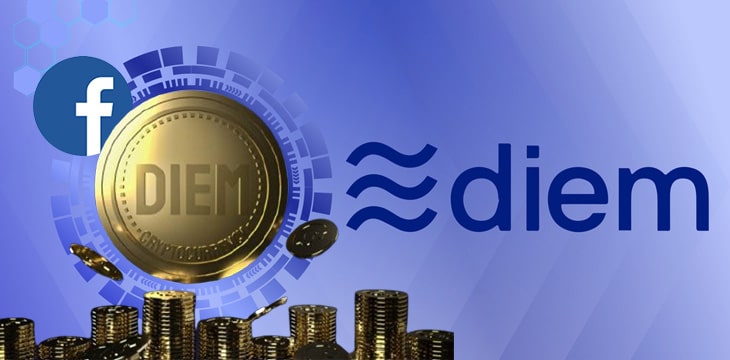Meta, formerly Facebook, has officially announced that it intends to shut down its digital currency project Diem. For years, great efforts have been made to advance this initiative.
Stuart Levey, the CEO of Diem, confirmed on Monday that Meta is selling intellectual property and other assets related to the stablecoin project Diem to its Silvergate Capital Corporation.
The Diem Association and its affiliates will gradually cease operations "over the coming weeks," Levey said. However, the federation is confident that Diem's ideals will continue to thrive even after Meta's official exit from the project, as the CEO states:
"We remain confident that a blockchain-based stablecoin like Diem's can deliver the benefits that the Diem Association had in mind from the start. With today's sale, Silvergate is well positioned to advance that vision." .
According to an official announcement by Silvergate, the company will acquire assets from Diem for a total of $182 million . "As part of the integration of the acquired assets into Silvergate's existing technology, Silvergate anticipates additional costs of approximately $30 million in 2022," the company said.
Specifically, Silvergate Bank, a subsidiary of Silvergate and Meta's stablecoin partner , is looking to integrate Diem's assets into its payments platform, namely the Silvergate Exchange Network. With this new combination, the bank aims to create a "next-generation global payments system that is faster, easier to use and more cost-effective than existing solutions," according to the announcement.
"We have identified a need for a stablecoin that is pegged to the US dollar, regulated and highly scalable so that money can continue to move without impediments. We continue to aim to meet this demand by launching a stablecoin in the Year 2022", where Silvergate CEO Alan Lane.
Meta officially unveiled its digital currency project in 2019. This was originally called Libra and several top global companies such as Mastercard, PayPal, Visa, eBay and others were interested in working together. The project has run into trouble from regulators around the world , as tax authorities were concerned that tech giants would gain too much financial power.
Despite a lot of pressure from regulators, Meta tried to launch some services in the United States. Messenger WhatsApp tested payments with Meta's Novi wallet in December 2021.
"In the United States, a top regulator told us that Diem was the best designed stablecoin project the US government had seen," said CEO Levey.
While the Diem Association continues to work on its stablecoin, some of the original members are now also developing their own stablecoin projects. In January, PayPal officially confirmed that the company was "exploring a stablecoin" that could be dubbed PayPal Coin .
My Top PicksHoneygain - Passive earner that pays in BTC or PayPalMandalaExchange -The Best no KYC crypto Exchange!
BetFury - Play And Earn BFG for daily Bitcoin and ETH dividends!
Pipeflare - Faucet that pays in ZCash and Matic, Games pay in DAIWomplay - Mobile dApp gaming platform that rewards in EOS and BitcoinCointiply - The #1 Crypto Earning SiteLiteCoinPay -The #1 FaucetPay earner for LitecoinUpland - Collect Digital Properties & Test Your SkillsLBRY/Odysee - YouTube Alternative that lets you earn Money by viewing videos!FaucetPay - The #1 Microwallet PlatformFREEBTC - The #1 FaucetPay earner for Satoshi'sFaucetCrypto - An earning/faucet site that pays out instantlyFireFaucet - An earning site that pays better for some than Cointiply
DogeFaucet - Dogecoin Faucet
xFaucet - BTC, ETH, LTC, Doge, Dash, Tron, DGB, BCH, BNB, ZEC, FEY - Claim every 5 minutes
Konstantinova - BTC, ETH, LTC, Doge, Dash, Tron, DGB, BCH, BNB, ZEC, USDT, FEY, 25 Claims Daily


Comments
Post a Comment